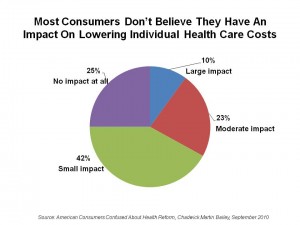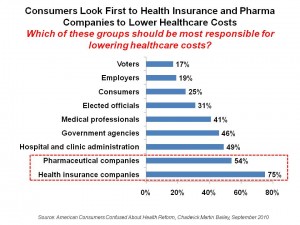Americans feel pretty helpless about their individual ability to lower health care costs. Most people look to health insurance companies and the pharmaceutical industry to be responsible for lowering health costs in the U.S.
A survey from Chadwick Martin Bailey and South Street Strategy looks at Americans’ views on health reform and health care costs in late summer 2010 and finds people still confused about how health reform will impact them, and impotent in their ability to lower their costs.
American Consumers Uncertain About Health Reform summarizes the survey results, with the top line finding that 74% of people expect that health reform will impact their families in some way. However, many people aren’t certain what these impacts will be.
One thing’s for certain: Americans continue to worry about health care costs, and they blame health insurers and pharma companies for the high costs of health care. Health plans, along with government, are seen as the two key sources to provide information about health care reform (74% and 61%, respectively). However, only 14% of Americans look to pharmaceutical companies as a source for health reform information.
Methodology: Chadwick Martin Bailey polled 1,504 adults aged 18 and over online during the week of August 23, 2010. The researchers also conducted individual interviews to gain additional insights into peoples’ beliefs about health reform.
 Health Populi’s Hot Points: This poll finds that Americans tend to feel quite helpless in the face of rising health costs, and also don’t quite understand how health reform could impact them. They blame health plans and pharma for their cost-woes.
Health Populi’s Hot Points: This poll finds that Americans tend to feel quite helpless in the face of rising health costs, and also don’t quite understand how health reform could impact them. They blame health plans and pharma for their cost-woes.
The opportunity for these two sectors is to connect with health citizens in at least three ways:
1 – As information providers that can help consumers understand how health reform could impact their own and their families’ health.
2 – As support networks to help people navigate the changing health system.
3 – As partners in bending consumers’ personal health cost curves.
The third tactic might seem counter-intuitive: after all, health plans and drug companies are for-profit entities looking to maximize revenues for shareholders. However, given that these companies also sit toward the bottom of the industry reputation rosters, making efforts to help consumers manage cost could help to re-build eroding trust between the companies and consumers.
For health insurance, it’s about delivering value-based plans at a rational price, enhanced with useful tools, transparency and helpful, easy-to-navigate, actionable information. For pharma, it’s participating in greater dialogue about risks, providing tools for managing chronic conditions, and expanding and making drug assistance programs more accessible. Some branded pharma companies should re-examine their role in the generics business, demand for which will continue to grow with or without health reform.





 I love sharing perspectives on what's shaping the future of health care, and appreciate the opportunity to be collaborating once again with Duke Corporate Education and a global client on 6th May. We'll be addressing some key pillars to consider in scenario planning such as growing consumerism in health care, technology (from AI to telehealth), climate change, and trust -- the key enabler for health engagement or dis-engagement and mis-information. I'm grateful to be affiliated with the corporate education provider
I love sharing perspectives on what's shaping the future of health care, and appreciate the opportunity to be collaborating once again with Duke Corporate Education and a global client on 6th May. We'll be addressing some key pillars to consider in scenario planning such as growing consumerism in health care, technology (from AI to telehealth), climate change, and trust -- the key enabler for health engagement or dis-engagement and mis-information. I'm grateful to be affiliated with the corporate education provider  Thank you FeedSpot for
Thank you FeedSpot for